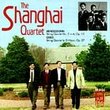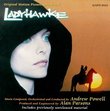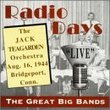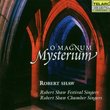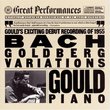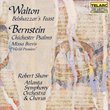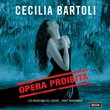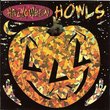| All Artists: Håkan Hagegård, Carl Orff, Robert Shaw, Atlanta Symphony Orchestra & Chorus, Judith Blegen, William Brown, Willie Brown Title: Carl Orff: Carmina Burana Members Wishing: 0 Total Copies: 1 Label: Telarc Release Date: 10/25/1990 Genre: Classical Styles: Opera & Classical Vocal, Historical Periods, Modern, 20th, & 21st Century Number of Discs: 1 SwapaCD Credits: 1 UPC: 089408005626 |
Search - Håkan Hagegård, Carl Orff, Robert Shaw :: Carl Orff: Carmina Burana
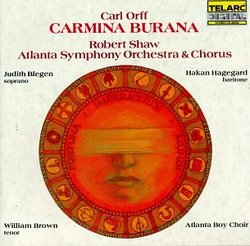 | Håkan Hagegård, Carl Orff, Robert Shaw Carl Orff: Carmina Burana Genre: Classical
As much as critics--and many musicians--love to hate this work, Carmina Burana is a uniquely entertaining and justly popular theatrical masterpiece. This collection of 13th-century secular poems, originally found in a B... more » ![header=[] body=[This CD is available to be requested as disc only.]](/images/attributes/disc.png?v=a4e11020) ![header=[] body=[This CD is available to be requested with the disc and back insert.]](/images/attributes/disc_back.png?v=a4e11020) ![header=[] body=[This CD is available to be requested with the disc and front insert.]](/images/attributes/disc_front.png?v=a4e11020) ![header=[] body=[This CD is available to be requested with the disc, front and back inserts.]](/images/attributes/disc_front_back.png?v=a4e11020) |
Larger Image |
CD DetailsSynopsis
Amazon.com As much as critics--and many musicians--love to hate this work, Carmina Burana is a uniquely entertaining and justly popular theatrical masterpiece. This collection of 13th-century secular poems, originally found in a Bavarian monastery, were selected, set to original music, and arranged for a large modern orchestra, vocal soloists, and choirs by German composer Carl Orff. Orff ingeniously used these large forces to create a work of astonishing and powerful simplicity. The simplest melodies, primal rhythms, and rudimentary orchestration combine for an unforgettably dynamic musical and dramatic experience. This is one of the first digital recordings of the work, and one of the more successful in balancing the large numbers of singers and instrumentalists. Judith Blegen's lovely rendition of "In trutina" is worth many hearings, and the energy and excitement generated in the sections for full choir and orchestra are something you just have to experience. --David Vernier Similar CDs
Similarly Requested CDs
|
CD ReviewsTwenty years late, but better late than never Bob Zeidler | Charlton, MA United States | 11/27/2000 (5 out of 5 stars) "I've had the LP version of this Carmina Burana performance by Shaw in my collection since its initial release in 1981 (recorded in November, 1980), and the CD version since it first came out a few years later (in 1984, as a very early Telarc CD). After listening to many versions of this over a period of decades, I now feel comfortable in saying that there is only one recording which tops it in performance values (Eugen Jochum leading the Berlin Germain Opera Orchestra and Chorus, with Gundula Janowitz in the all-important soprano role, on DGG), and absolutely none which can top it in recording values. Telarc, under the artistic and technical direction of Bob Woods and Jack Renner, was simply years ahead of all of the major record labels in sound quality. Robert Shaw has the measure of this work. The opening O Fortuna chorus must be measured and deliberate, not rushed, and here Shaw paces his forces, and his dynamics, perfectly. The Atlanta Symphony Chorus is simply without equal in its ability to generate and project beautiful tone at any volume level, and, of course, in the opening and closing O Fortuna choruses, the volume called for is considerable. Hakan Hagegard does fine in his baritone solos, and William Brown provides a delicious "roasted swan" episode. But pride of place among the soloists must go to Judith Blegen, here providing one of her finest performances on record. Her performance of In Trutina, the penultimate solo before the return of O Fortuna at the conclusion, is equalled in sheer vocal beauty only by that of Gundula Janowitz on Jochum's recording. It is the type of tune that just melts one, and that is precisely what Ms. Blegen does here. Try to forget the amaeturish efforts of the likes of Sarah Brightman and Charlotte Church singing, and trying to popularize out of context, this beauty. Go for the real thing - and the full work - with Judith Blegen. One of Robert Shaw's finest and most popular recordings, and a Telarc audiophile milestone, as powerful, dynamic and detailed today as it was when recorded two decades ago. The performance and recording have stood the test of time remarkably well. Bob Zeidler" Perfectly wrong... Scott Perkins | Boston, Massachusetts | 09/25/2000 (3 out of 5 stars) "Robert Shaw is widely regarded as the foremost choral conductor of his generation, and perhaps even of all time. Shaw's choruses had a unique sound because of his obsession with diction, purity, and blend, creating some of the most graceful and technically pristine renditions of many of the great choral masterworks.Orff's writing, on the other hand, is for the most part anything but graceful. Carmina Burana is one of his tamer works by far, but there is still plenty of evidence associating it with the rough, barbaric texture of his other works, which often include shouting from the chorus and explosions of sound from his beloved percussion (i.e. `De temporum fine comoedia'). The Nazi party in particular, who especially enjoyed Carmina Burana, championed the crude, primitive, and powerfully motivational excitement of his music.I find that in this recording, Shaw stays true to his form, creating beautiful, graceful sounds from his chorus, which in the case of this composition is entirely inappropriate. The carnal power that drives movements such as `Were diu welt alle min' and `In taberna quando sumus' is simply absent. The result evokes imagery closer to a couple sipping wine in an expensive Italian restaurant rather than a bunch of drunken men in a tavern, one yelling about how he is the abbott of Cuckoominster.Among the soloists, soprano Judith Blegen and baritone Hakan Hagegard give fine performances. Tenor William Brown on the other hand, given the task of illustrating the pain felt by a duck as he is being roasted in an aria with an absurdly high tessitura (Olim lacus colueram), switches to falsetto on the highest pitches and seems to abandon his sense of intonation. The result is certainly painful, but not necessarily in the way it was intended.Finally, one should note that this recording divides the work, consisting of 25 separate movements, into only four tracks, which is simply annoying. A far better recording of Carmina Burana, in my opinion, which much better captures the excitement inherent in the writing, is Slatkin's performance with the Saint Louis Symphony Orchestra and Chorus. Hagegard is also the baritone in this recording; Sylvia McNair delivers an even more innocent and pure performance (appropriate, in this case, since she represents a young virgin) than Blegen; and John Aler gives the most passable rendition of the tenor aria I've heard, never once switching to falsetto, even on the high C'd and D's." The best of the available recordings I have heard Bob Zeidler | 10/31/1998 (5 out of 5 stars) "I have 5 versions of the 'Carmina Burana' and this is the most spectaular of the lot. Hakan Hagegard is phenomenal on 'Circa Mea Pectora'. Shaw shows that he is a master of Choral music. The only problem I have with it is the fact that the CD has only 4 tracks. While this divides the work as was written it makes it difficult to listen to favorite portions, the lesser versions have each piece as a separate track. Still this is the one to buy!"
|

 Track Listings (4) - Disc #1
Track Listings (4) - Disc #1


